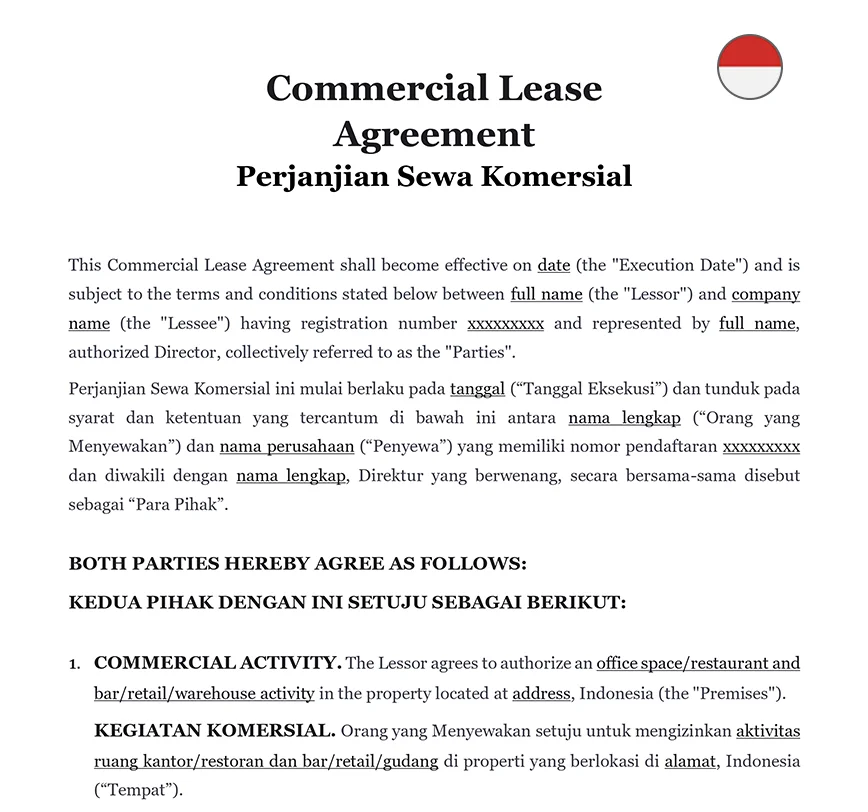Ready to use legal template
Drafted by experienced lawyers
Indonesian-English translation
Ready to use legal template
Drafted by lawyers
Indonesian-English translation
Home › Rent your property › Commercial lease agreement
Learn more about Commercial Lease Agreement in Indonesia
A Commercial Lease Agreement is a legally binding contract between a landlord and a business tenant that outlines the terms and conditions for renting commercial property. It specifies key details such as lease duration, rental terms, maintenance responsibilities, and permitted property use. In Indonesia, having a Commercial Lease Agreement is essential to protect both parties’ interests and ensure compliance with local property and business regulations. Whether leasing office space, retail stores, or industrial properties, businesses must ensure their lease agreement aligns with Indonesian laws and business practices. Download our Commercial Lease Agreement, easy to edit in Word format, professionally drafted by experts in English and Indonesian, ensuring clarity and legal compliance.
Table of contents
-
What is a Commercial Lease Agreement in Indonesia ?
-
What should be included in the commercial rental contract?
-
What to consider before signing a Commercial Lease Agreement?
-
Is a Commercial Lease Agreement legally binding in Indonesia ?
-
What are the Indonesian landlord’s responsibilities?
-
What are the tenant’s responsibilities?
-
Can I renew the Commercial Lease Agreement in Indonesia?
What is a Commercial Lease Agreement in Indonesia ?
A Commercial Lease Agreement is a legal document that specifies the terms under which one party agrees to rent another party’s property. The agreement requires the lessee to make monthly payments for a certain length of time in exchange for the landlord’s property. If the lessor and lessee fail to follow the terms of the contract, both will suffer repercussions.
A Commercial Lease Agreement is a contract between a landlord and a tenant to rent property with the goal of running a company.
When a property is rented for an extended length of time, such as 1-5 years or longer, a lease document is usually necessary. In such instances, a lease deed agreement plays a crucial role in sustaining the relationship between the landlord and the renter by establishing legally binding requirements.
What is included in the Commercial Rental Contract?
Property information, including the landlord and renters
The property information must include the type of business premise being leased, whether it is a shop lot, shop unit, or office lot, as well as the sort of business that will be conducted at the property.
If the landlord or tenant is a corporation, the agreement should clearly include its complete name, company number, and registered address; if the landlord or tenant is an individual, the agreement should state his or her full name and NRIC number/passport number.
Utilities Deposit and Refundable Deposit
The security deposit is a sum of money that is usually equivalent to a number of months’ rent, depending on the tenancy period specified in the tenancy agreement, and it is paid to the landlord by the tenant upon execution of the tenancy agreement to protect the landlord from any breach of agreement on the tenant’s part. The utility deposit will be used by the landlord to cover any unpaid utility bills at the conclusion of the tenancy.
Monthly lease
To preserve the interests of both parties, the monthly rental due by the tenant for the demolished premises should be specified as clearly as possible. To minimize any potential disputes, the tenancy agreement should include the date on which rent is to be paid as well as the mode of payment.
Failure to make monthly rental payments
Most commercial tenancy agreements provide a “grace period” for a reasonable number of days beyond the payment’s due date. Once the grace period has elapsed, the landlord may levy late payment interest on the outstanding balance.
Clause of Force Majeure
This is an important provision in a tenancy contract that releases both parties from responsibilities or duties in the case of an unanticipated incident that is beyond both parties’ control.
Every tenant should be extremely cautious about whether the leasing agreement has a force majeure provision, because one can only depend on it if it is specifically written in the tenancy agreement. If a firm is unable to operate due to a nationwide lockdown but is still required to pay rent every month, the business’s debt will undoubtedly increase.
What to consider before signing a Commercial Lease Agreement?
1. Comprehensive insurance and repairs
Any repairs will be your responsibility, as will the payment of the insurance premiums for the property. It is your obligation to ensure that you are pleased with the insurance coverage and that any additional coverage is purchased. During your lease, you must guarantee that commercial rates and any local authority repair notifications are paid.
2. Completed Survey
A survey is recommended before signing a lease on a business property. This will assist you in determining if the financial consideration requested by your landlord is reasonable given the circumstances. A survey will also allow you to highlight any actual or imagined flaws or areas of degradation. A survey completed before the lease signing will provide you with an accurate image of the building’s condition at the time of departure.
3. Clauses for early termination
These provisions allow renters to leave their lease early, although they generally come with stipulations. It is critical to carefully review the wording of break provisions to ensure that you are completely protected if you decide to exercise it later.
Is a Commercial Lease Agreement legally binding in Indonesia?
Commercial leases are legally binding agreements between landlords and renters. They grant renters the right to use the premises in a certain manner for a defined amount of time in exchange for a predetermined rent. Your rights and duties as a tenant, as well as those of your landlord, will be outlined in your lease.
Commercial leases are treated differently by the courts than residential leases because they are considered as a contract entered into by informed and experienced business persons who are expected to be able to negotiate conditions themselves. As a result, when commercial contracts go wrong, there are less safeguards in place. As a result, it is critical to get the advice of an experienced commercial property counsel before signing or negotiating a lease.
What are the Indonesian landlord’s responsibilities?
These are the landlord’s duties under the commercial tenancy agreement.
Keeping the demised premise insured against loss or damage by fire at all times during the tenancy period and ensuring the tenant shall peaceably hold and enjoy the demised premise without any interruption from the landlord or any person claiming on behalf of the landlord as it may result in loss of profit to the business. If the landlord makes any further covenants or guarantees, all of them should be fully specified in the leasing agreement.
What are the tenant's responsibilities?
There are affirmative covenants and negative covenants that describe the duties that the renter must meet.
Paying rent and all utility charges on time and keeping the interior of the demised premise in good and reasonable condition are usually included in the former, whereas the latter includes prohibitions on the installation of extra electrical socket plugs, power points, and structural changes to the demised premise in order to ensure the property is safe in all aspects.
The landlord is not required to apply for a business premise license, also known as a trade license, for the tenant to run the business that he or she intends to operate, so the tenant must apply for the necessary business licenses as required by the Companies Act 1965.
Can I renew the Commercial Lease Agreement in Indonesia?
A renewal option is a common contractual clause that appears in commercial tenancy agreements because a business that has been in operation for a few years will usually choose not to relocate because a customer base has already been established and no reasonable businessman will give up a well-established customer base and choose a brand-new start.
The length of option to renew is frequently included, and it is advantageous for the tenant to prolong the agreement for a longer duration after the initial term expires.If the tenant truly intends to prolong the tenancy time beyond the conclusion of the first term, he or she should be cautious of the leasing agreement’s option to renew term. If the term “may” is used, it merely implies that the landlord has the option of renewing the tenancy with a new agreement or refusing to do so, but this is a different topic. If the term “must” is used, the landlord is then obligated to renew the tenancy.
Commercial LeaseAgreement Template (.docx)
Save on attorney fees
310 client reviews (4.8/5) ⭐⭐⭐⭐⭐
Share information
Why Themis Partner ?
Make documents forhundreds of purposes
Hundreds of documents
Instant access to our entire library of documents for Indonesia.
24/7 legal support
Free legal advice from our network of qualified lawyers.
Easily customized
Editable Word documents, unlimited revisions and copies.
Legal and Reliable
Documents written by lawyers that you can use with confidence.




